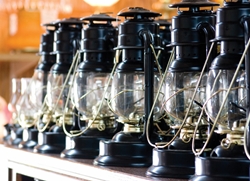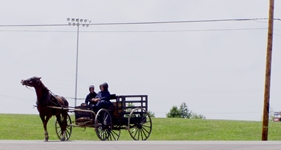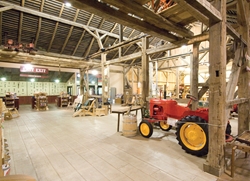 |
 |
| A virtual coffeehouse for
technological minds and ideas |
|
Living Off The Grid
When we made the trip I discovered that my apprehension, and
many of my assumptions, were unfounded. Instead of being bored I
was fascinated by people and a lifestyle that was simple, but
fulfilling, and without many of the annoyances and complexities
that drive the rest of us crazy.
One of our destinations was a hardware store and historical museum
named Lehman's. In addition to serving as a marketplace for
goods and products it's also a great place to learn about the
area's past, and the Amish communities and lifestyles there. When
I decided to write about this I contacted them from a brochure I
saved, and was able to
ask some questions from Glenda Lehman-Ervin - an operating
member of this family owned business.
Q. How long have you been involved with the Amish community?
Q. What do you enjoy most about this involvement?
Everything -- they are delightful, hardworking craftspeople, with a wonderful work ethic.
They keep us in touch with our roots by reminding us
of the importance of family and the beauty of simplicity. They
like to eat every meal "with their feet under their own table,"
which means at home with their loved ones, and they live in a
much less complicated, disposable world. They also don't have
the capitalist/materialistic mentality that many of us do (more
is better!) and they don't compete with each other. Sameness is
valued so there is a lack of envy and jealousy. They are still
creating hand weaved baskets, hickory rockers, wood toys and
custom wrought iron -- items that are hard to find being made in
the United States today.
Q. I had previously believed that the use of electrical energy, of any kind, was against Amish religious beliefs.
I've since learned that this isn't necessarily true. Can you explain why many people may have this misconception,
and what the Amish view of electricity really is?
Q. So how would they be affected, or unaffected, by
a blackout or power outage?
When there is a power outage in
our area, like the Great Blackout of August 2003, for example,
many of the Amish aren't even aware of it. Their daily existence
is not changed much by the electric grid. Although, if an Amish
person works in an English business, such as a restaurant, they
would be affected as would their co-workers. And if there were a
long-term power outage (a week for example) they would notice
the effects because they often shop at local grocery stores.
Q. What are some of the various ways that Amish communities have learned to enjoy a quality lifestyle without being
connected to outside power lines? Family and home is the most important thing to an Amish person. They are not
caught up in the materialistic, capitalist mentality that the English (which is what they call us) are. Again, that
DVD explains this in detail.
We have everything
you need for heat, food, light and water with no electricity. Wood cook stoves, hand tools, oil lamps, water pumps,
gas refrigerators, hand cranked grinders and juicers, canning equipment, wheelbarrows and much more.
Q. During your interaction with Amish communities do they ever express a wonder or desire to enjoy more modern things
like television, computers, or the Internet?
I would say no, but you'd have to ask them! It is very foreign to them
and they know their families wouldn't approve. Plus they aren't used to it. If you didn't have a swimming pool and
sauna inside your house, but knew someone that did, would you miss it? :)
Q. What are some things that technophiles, like myself, could learn from these communities that might benefit the
quality of our own lifestyles?
The simplicity and the beauty of a rural life. If you have a regular lawn mower that
won't start, you have to wonder about gas, or oil, or some other mechanical problem that you might not know how to fix.
If you have a push mower, and it isn't working, you aren't walking!
You can visit Lehman's website @
http://www.lehmans.com/
P.H. |
add to favorites
|
 del.icio.us
del.icio.us
 Slashdot It!
Slashdot It!
 Stumble It!
Stumble It!
Home | About Us | Advertise | Submit an Article | Submit a Link | Contact Us
ElectronCafé.com is a registered property of electricalfun.com Copyright © 2008 - All rights reserved
 It’s our nature to fill the voids of our ignorance with our own assumptions.
That's exactly what I had done with my beliefs about the Amish
community. I knew that they typically didn't use electricity,
and from that I drew a conclusion that they must have a moral
objection to it based on their religious beliefs. As a former
electrician, and current technology enthusiast, I didn't have an
immediate interest when my girlfriend suggested that we travel
to Ohio to visit some of the Amish towns and villages there.
That would be like the antithesis of everything I find exciting,
I thought to myself. I would be bored, and they would disapprove
of my lifestyle and occupation if they knew about it. These were
the thoughts that ran through my uninformed mind.
It’s our nature to fill the voids of our ignorance with our own assumptions.
That's exactly what I had done with my beliefs about the Amish
community. I knew that they typically didn't use electricity,
and from that I drew a conclusion that they must have a moral
objection to it based on their religious beliefs. As a former
electrician, and current technology enthusiast, I didn't have an
immediate interest when my girlfriend suggested that we travel
to Ohio to visit some of the Amish towns and villages there.
That would be like the antithesis of everything I find exciting,
I thought to myself. I would be bored, and they would disapprove
of my lifestyle and occupation if they knew about it. These were
the thoughts that ran through my uninformed mind.
 53 years! My father, Jay Lehman, started Lehman's in 1955 to serve the local
Amish community with the non-electric products they need to maintain their lifestyle.
Today, in a twist of irony, we have some Amish customers, but more importantly Amish vendors.
So Dad is still helping them preserve their way of life by providing an outlet for their hand-crafted products.
This means that not only can they work from home, which preserves their farm lifestyle, but they teach
their skills to the next generation. By buying large amounts of hickory rockers, custom wrought iron pieces,
and hand weaved baskets, for example, we provide an income for our Amish neighbors.
53 years! My father, Jay Lehman, started Lehman's in 1955 to serve the local
Amish community with the non-electric products they need to maintain their lifestyle.
Today, in a twist of irony, we have some Amish customers, but more importantly Amish vendors.
So Dad is still helping them preserve their way of life by providing an outlet for their hand-crafted products.
This means that not only can they work from home, which preserves their farm lifestyle, but they teach
their skills to the next generation. By buying large amounts of hickory rockers, custom wrought iron pieces,
and hand weaved baskets, for example, we provide an income for our Amish neighbors.
 They call it
the invisible barrier -- they believe they are
called to be IN the world, but not OF the world. They are also under the constraints of a local Bishop, unlike
most organized religions. We sell some wonderful books and a DVD (The Amish, How They Survive) that explains this well.
They call it
the invisible barrier -- they believe they are
called to be IN the world, but not OF the world. They are also under the constraints of a local Bishop, unlike
most organized religions. We sell some wonderful books and a DVD (The Amish, How They Survive) that explains this well.
 Q. What are your most popular products that help them have convenience in living this lifestyle?
Q. What are your most popular products that help them have convenience in living this lifestyle?